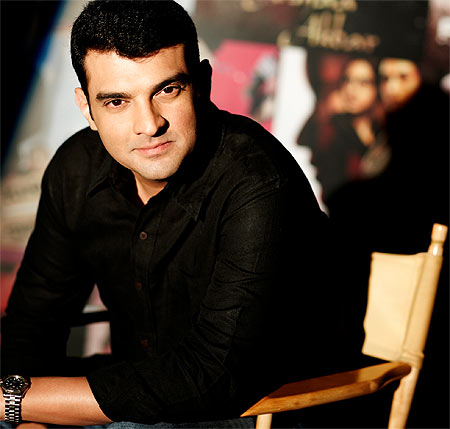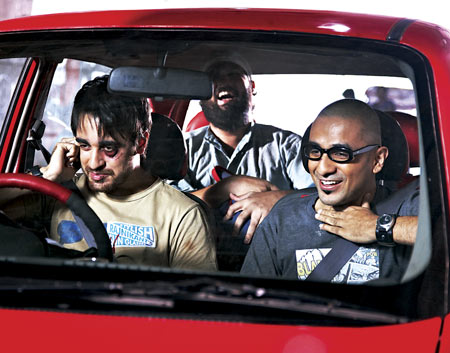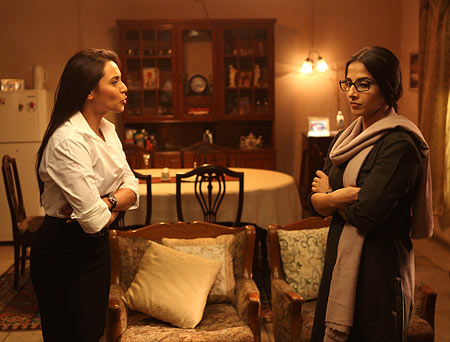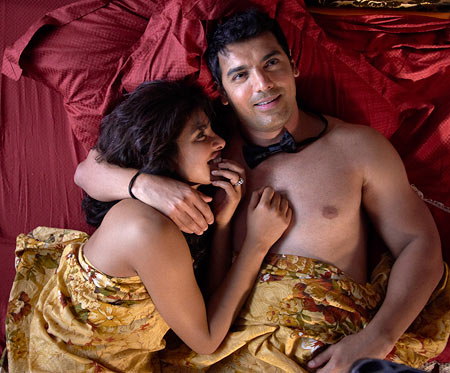 | « Back to article | Print this article |
'Making a good film is not enough today'
UTV Motion Pictures is one of the biggest production houses in the film industry today. While a chunk of credit goes to its head Ronnie Screwvala, its CEO Siddharth Roy Kapur deserves some too.
The 38-year-old man, who is known for his alleged romance with Vidya Balan these days, has been a part of UTV since 2005.
He opened up to Sonil Dedhia about the company's strategies, why marketing of films has become so important and Walt Disney's controlling interest in the company (in a deal pegged at Rs 20 billion).
How was the year 2011 for UTV Motion Pictures?
It was a fairly good year for the company. We had two path breaking movies. No One Killed Jessica was released in January, which is like a graveyard month to release a film. The film had two actresses and no male lead but still managed to cross Rs 40 crore at the box office.
The second film was Delhi Belly, which was an English film dubbed in Hindi and with some of the most profane language used in India and did business of more than Rs 75 crore in India.
Both films redefined the rules in their own ways and made us aware that audiences today are open to watching all sorts of cinema.'The first weekend has become very crucial for any film'
On the other hand, you also had films such as Dhobi Ghat, 7 Khoon Maaf, Thank You and others, which did not do well.
You do feel bad when your films don't work. Unfortunately, some films don't connect with the audience, but we are still very proud of all our films. 2011 was a less busy year than we normally have.
What is happening to Spotboy? Has the UTV Spotboy model of making small films worked well enough to continue with it?
UTV Spotboy was created to give a break to the new talent in the industry and also to explore films in different genres. We don't want to be pigeonholed as a company that makes only youth films.
I think intrinsically if we know that a film will be out of bounds of typical mainstream cinema, then irrespective of whether the director is new or established, it might be branded as a Spotboy film.
What changes do you see in the kind of films that are being made today in Bollywood?
I have seen a huge change in the kind of films that are made since the time I joined UTV six years ago. Not only the films, audiences too have changed and they have started accepting certain kinds of films.
Just last year we had films like Zindagi Na Milegi Dobara, The Dirty Picture, Singham, Delhi Belly, Bodyguard... and the list goes on. All these films were commercially successful, but if we have to talk about what they had in common, the only thing that anyone can find is that all the films were entertaining.
Audiences today are exposed to all sorts of content through various television channels. It is time we give the audience a differentiated content that is entertaining in nature.
'The biggest stars have become very savvy about marketing their films'
Do you think the era of films celebrating silver jubilees is over?
I think you are right. Today, a film running in a theatre for 25 weeks is pretty much unheard of. The first weekend has become very crucial for any film. The marketing effort building up to the opening day is huge.
Are you saying that the box office collection has become more important today?
No, it is the other way round. Ten or 15 years ago, box office collections accounted for 90 per cent of a film's business. Today, it accounts for around 50 per cent of the business. The rest of the business comes from satellite rights, music rights, overseas rights and all sorts of other rights, which are related to films. The theatre collection as a percentage of the overall revenue has decreased.
Having said that, the most visible and glamorous quotient of the success of the movie is when it works in theatres.
The dynamics of film marketing has also changed in recent years...
It has changed tremendously. Earlier, actors would promote the film in a few cities, do some interviews and that was pretty much it.
Today, the biggest stars have become very savvy about marketing their films. From participating in television shows to live performances and also an international premier, actors are putting a lot of effort into promoting their films.
This has led to increases in the budget of films.
Bollywood is still better off than the West where they spend much more on marketing than the cost of production of a movie.
Today we are operating in a very fragmented environment. Movies today are not only competing with other movies, but there is so much brand messaging going on all over the place. If someone wants their film to be noticed, they have to break through the clutter and that is where marketing helps.
Making a good film is not enough today. If a good film is not marketed well, it is not going to be successful at all.
'Disney is going to provide a huge platform for our films to make their mark overseas'
Tell us about the Walt Disney-UTV deal.
UTV is now a part of the Walt Disney Company overall and this helps UTV to explore the market with an interesting slate of movies.This year we are doing 12 films in Hindi, eight films in various southern languages and we also have Hollywood films.
With so much on offer and as a consolidated entity it is really a strong slate of films that will help the exhibitors and the sub distributors.
How does Disney's takeover help UTV?
Frankly, I don't think the Indian film industry has tapped even an iota of what the potential is overseas.
We have got a diaspora of 30 million South Asians outside India. For a big film we release around 400 prints all over the world, which clearly indicates the appalling gap between demand and supply. This is also leading to piracy of films.
Disney, which is a 70 billion dollar media conglomerate, has a strong infrastructure in place all over the world, which will help us in exploring new markets and also give us better avenues.
It will also help us take the maximum advantage of Disney's existing theatrical and non-theatrical distribution system. Disney is going to provide a huge platform for our films to make their mark overseas.
With this rebranding, what are the key areas the company will focus on?
Disney has a legacy of great storytelling and has come up with some innovative ideas and the use of technology in those ideas. Focusing of brands and franchise is one of the biggest strengths of Disney and that is what we would like to explore.
At UTV, we have produced a plethora of sequels but never had a franchise, which includes gaming, merchandising or even amusement parks.
'Indian film industry has tapped even an iota of what the potential is overseas'
Given that Disney is known for a certain kind of film, can we expect UTV to concentrate only on such films?
The way we look at it is that on our slate we will now have some Disney films, some UTV films, UTV Spotboy films and we might even have some Marvel films.
UTV will be responsible for releasing Disney and Pixar film in India. We have always believed in giving the audience a bouquet of films, which cater to different genres.
UTV is to be delisted and renamed. Will that affect the company, the investors and the staff?
I can tell you in a single line that it is going to be delisted, but not to be renamed, but the brand will stay.
How do you think Disney's takeover will help UTV in the Indian market?
With both brands co-existing, it will work towards creating great value for the company. There will be Disney movies, which will be released every year and which will be locally produced in India.




